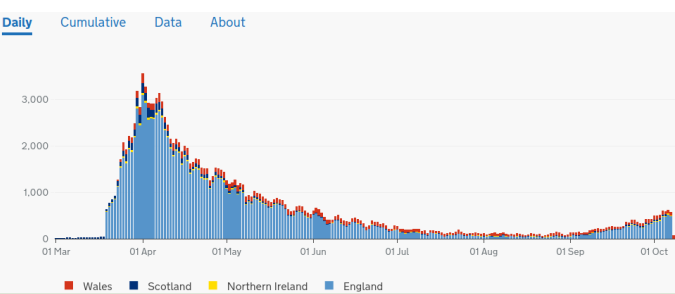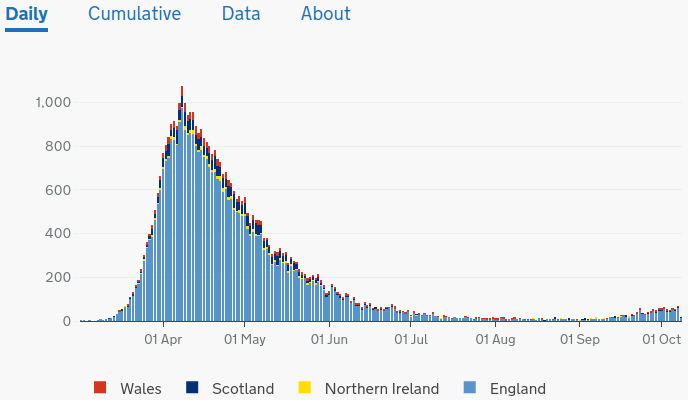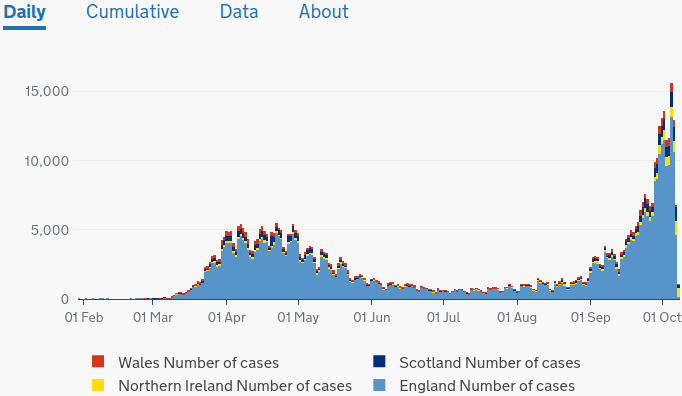2020-10-09
Is Testing Reliable?
(06/09/2020) The BBC no less is now reporting that the Covid tests may be "too sensitive" resulting in "false positives". This does rather pull the rug from under the prevailing dogma that only more and more tests can protect us from the much-heralded "second wave" (if this is based on any actual evidence I have yet to see any).
They also mention that:
"some experts say it is uncertain how a reliable test can be produced that doesn't risk missing cases".
Quite so - anyone with any passing interest in matters medical will tell you that there is always a trade-off between catching too many and catching too few - what is certain about tests of this nature is that there will always be errors. Why on earth is this a surprise to any "expert"?
Also this little gem:
"The flurry of information about testing and the R number creates confusion".
But however we cut it, the fact remains there are very low levels of infection in the UK overall, lower than a number of other European countries".
Is the BBC finally catching up with the reality (obvious to anyone who has been following the statistics) that the Covid "pandemic" was over in July and never merited the description of "pandemic" in the first place?
Perhaps though, on the bright side, the BBC's new DG is making his presence felt - will we be seeing more balanced reporting from the BBC in the future? Hope and pray.
See also this similar article in the New York Times (but note that the USA tests may not be the same as those used in the UK, although they all seem to be based on the PCR test).
In the light of all this uncertainty, should we not discard the current testing process as not viable, and concentrate on statistics that should be both near enough correct and easy to understand - the rate of UK hospital admissions as reported by HMG (https://coronavirus.data.gov.uk/)?
Firstly hospitalisations (running at around 520 daily):

And actual deaths (now running at around 60 daily - and note different scaling!):

https://coronavirus.data.gov.uk/ (as at 10th October)
This would have the undoubted merit of measuring real sickness, rather than people who unreliably test positive but have either no symptoms or only a mild case of the sniffles . . .
(01/07/2020) Test reliability is a critical factor, since Covid-19 symptoms are not specific to Covid-19. In fact they are also applicable to many other ailments, including other coronaviruses (common cold), flu, and other miscellaneous "flu-like" (a categorisation used by Public Health England as a catch-all for all similar ailments including Covid-19 for statistical reporting purposes), and even pneumonia and radiation sickness!
Another factor is that all hospital admissions are routinely tested for Covid. We know that PHE has been recording all positive covid tests as covid (regardless of other conditions) in the past, and that the PCR test is not infallible.
This test was not invented for diagnostic purposes, so is being straight-up misused when applied for diagnostic purposes. It is reported that even the inventor of this test had stated that it should not be used for diagnosis. Read more about it. Draw your own conclusions.
For comparison, these are the positive test numbers published (to scare us?) - they are meaningless unless used to estimate the number of "infections" per million of population (to provide comparable figures over time). Why are these not published? We are either in for the biggest Covid tsunami imaginable or the numbers of "cases" being reported do not reflect the incidence of illness present within the population. Go figure.



